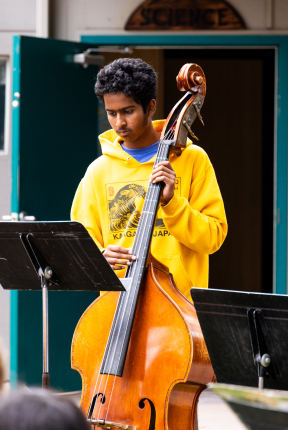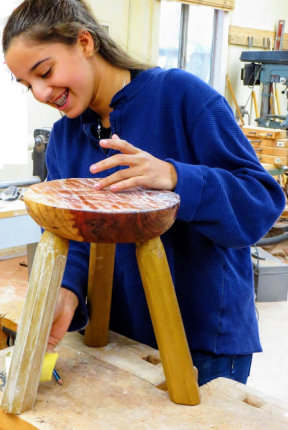We invite you to learn about our school’s perspective on media and technology.
Waldorf Education is based on a very clear view of child development. It recognizes that children grow continuously throughout the first 18 years of life and that different approaches to education are appropriate at different stages in the child’s development. Children of 4 or 5 learn differently than students of 18, and the way in which they are taught should change with them.
In addition to our understanding of child development, Waldorf Schools take the long view of education. We see our job as preparing students with a well rounded foundation for lifelong learning, allowing our students to graduate as socially responsible free thinkers with strong creative and critical reasoning skills.
To best prepare our students for life in college and beyond we are committed to helping students develop the most complex neural network possible. In short, our young students spend time in activities that help build a better brain. Research shows that the more complex a person’s neural network the better able he is to make creative associations, think in non-traditional ways, and to develop discernment and critical thinking. Given the tremendous amount of change that is taking place in today’s world, a better brain is a key in preparing today’s students for an uncertain tomorrow.
The complexity of the neural network is best stimulated when a child is young. Certain kinds of activity help build a better brain, while other tech-centered activities provide entertainment without stimulating the development of the brain itself. Studies show that far more brain development occurs when a child is poking at the ground inspecting insects in the garden than when he is engrossed with an educational TV show or a “developmental” computer game.
For this reason Waldorf schools are staunch advocates for the protection of childhood. Our youngest children play in non-academic kindergartens, involved in play-based activities that develop social skills, imagination, coordination and balance. They are not forced into early academics or the inappropriate use of computer technology, as these are counter-productive to healthy child and brain development. Our faculty encourages parents to support their children at home with similar healthy activities. A diet rich in TV, media and computers is actively discouraged.
In the early grades (1st to 6th) students are engaged in increasingly academic classroom subjects. In addition to mathematics and writing, two foreign languages are introduced in first grade. Musical instruments (recorders, stringed instruments and then wind instruments) are also part of the curriculum, as are handwork, painting and other artistic expressions. These all work together to stimulate the continued growth of the brain. Outside of school our students are encouraged to practice their instruments, do a reasonable amount of homework, and enjoy meaningful periods of outside physical activity. Help with family chores and assisting with the preparation of dinner fill up the balance of the afternoon and evening, and cultivate the child’s sense of self confidence and personal responsibility. TV and computer games continue to offer very little value to the developing child.
When the young child reaches adolescence he has the ability and the need to use computers and other new media as part of the increasingly academic nature of his studies. The use of computers to write papers and prepare presentations is appropriate and important at this age, and the well developed brain of the Waldorf student is able to use these tools in creative and thoughtful ways in junior high, high school and beyond. Technological literacy is a critical 21st century skill, and can be mastered quickly when children reach adolescence and have the developmental maturity to know how, why and when to use technology as a tool.
Our experience shows that minimizing or eliminating TV watching by children and delaying the use of computers to an age-appropriate time is a tremendous gift to the growing child. We encourage each parent to help their child build the best brain possible. Thoughtful choices about media and technology lead to a strong foundation for lifelong learning, strengthen creative and critical thinking skills, build self confidence, and develop an appreciation for others so he or she can be a socially responsible free thinker later in life.
The truth about technology and Waldorf Education is this: it’s not an either/or choice. It’s a matter of choosing the right thing at the right time. Please choose wisely – your child is depending on your choice.
Read more:
http://www.huffingtonpost.com/cris-rowan/technology-children-negative-impact_b_3343245.html






